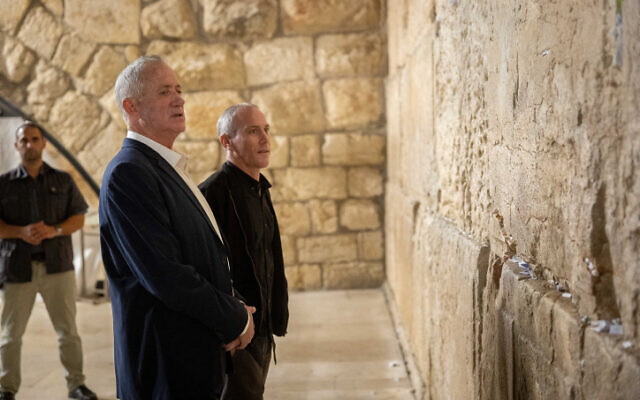Politicians in the bloc loyal to Benjamin Netanyahu celebrated exit polls released at the close of voting on Tuesday evening as the surveys predicted the former prime minister would be able to form a right-wing government.
Meanwhile, lawmakers from the current government urged supporters to wait for the actual election results before jumping to any conclusions about a potential path forward.
Polls from all three leading Israeli TV networks — which have been inaccurate in the past — showed Netanyahu’s bloc garnering 61-62 seats and parties backing Yesh Atid leader Yair Lapid with just 54-55, with another four seats going to Hadash-Ta’al, which has long stated that it will not join any government. At least 61 seats are needed to form a government in the 120-seat Knesset.
If the polls are accurate, the outcome would make it likely Netanyahu’s Likud could join forces with the hardline right-wing Religious Zionism and the Haredi Shas and United Torah Judaism parties to form a government. Official results remain far off, though.
In comments to supporters delivered shortly after the exit polls were released, Netanyahu welcomed the predictions but said the celebrations should wait.
“It’s a good start, that’s all I can say right now,” Netanyahu said in a live video broadcast on Instagram.
Likud leader Benjamin Netanyahu waves to his supporters during a national election, in Ashkelon, Nov. 1, 2022. (AP Photo/Tsafrir Abayov)
“It depends on the real count, which we don’t know… the exit polls are not the real count,” he said in a message delivered in English.
Netanyahu also repeated an unfounded accusation of voter irregularities at certain polling stations in Arab communities, saying that he was waiting for the “real count, not the fake count that somebody is trying to subvert by violence or intimidation.”
The Central Elections Committee said in response that it has no evidence of irregularities at polling stations in Arab communities.
“Given that the counting [of votes] has just begun, there is definitely no basis for unfounded rumors about supposed ‘forgeries’ in one community or another,” the committee said.
Police also shot down the accusation, saying there were no indications of voting irregularities.
Other lawmakers in the right-religious bloc were quicker to declare victory.
“Today Religious Zionism made history with the biggest-ever result for a national-religious party since the founding of the state,” tweeted Religious Zionism leader MK Bezalel Smotrich, whose party, along with the allied Otzma Yehudit faction, has been predicted to receive 14-15 seats in the exit polls, which would make it the Knesset’s third-largest party.
Smotrich said he was now “waiting patiently for the real results so we can God-willing safely establish a right-wing, national, Jewish and Zionist government.”
Meretz Minister Esawi Frej lamented the purported surge of the far-right Religious Zionist party, whose No. 2, Otzma Yehudit’s Itamar Ben Gvir, has campaigned on a starkly anti-Arab platform.
“Fourteen mandates for Ben Gvir is 14 mandates for hatred of Arabs,” the Arab lawmaker said.
“The third-largest party in the Knesset is a racist, violent, Kahanist party that doesn’t want me or my children here,” he said, referring to Ben Gvir’s support for the late extremist rabbi Meir Kahane.
“This is no longer a slippery slope, but the abyss itself,” Frej said.
In a speech to supporters in Jerusalem Tuesday night, Ben Gvir said he recalled celebrations in past elections after the exit polls, “and then great disappointment when we woke up to a government with the Ra’am party.” The current coalition was formed with the support of the Islamist Ra’am party, a common target for right-wing lawmakers.
Nevertheless, Ben Gvir, said, “we have to celebrate this incredible achievement of Religious Zionism-Otzma Yehudit,” and vowed to create a “full division” from those who support the State of Israel and those who “seek to undermine it from within.”

MK Itamar Ben Gvir casts his vote at a voting station in the West Bank settlement of Kiryat Arba, November 1, 2022. (Noam Revkin Fenton/Flash90)
Yesh Atid’s Yoel Razvozov, the tourism minister, urged observers not to jump to conclusions based on the exit polls, which predicted his party would receive 22-24 seats but would be unable to form a government.
“It’s happened before that one side or another celebrates, but things end up going another way,” the minister told the Kan public broadcaster shortly after the exit polls were released. “We have to wait for the final results, and then we’ll start to form the next government.”
Yesh Atid MK Moshe Tur-Paz tweeted: “Our hope has not been lost,” a quote from “HaTikvah,” Israel’s national anthem.
Hadash-Ta’al leader MK Ayman Odeh, whose party has been predicted to receive 4 seats in the exit polls, also said he was waiting to see the actual vote tallies.
“We’re waiting for the real results but we’re optimistic,” said Odeh, thanking his party’s supporters.
Culture Minister Chili Tropper of the National Unity faction renewed his party’s vow to not sit with Netanyahu in a coalition.
“Unfortunately it appears that the results are leaning toward a Netanyahu victory,” Tropper told Army Radio. “If that’s what the people have chosen, we will serve the nation from the opposition. We will not sit with Netanyahu.”
Tropper reiterated National Unity’s campaign promise that its leader, Defense Minister Benny Gantz, “is the only one who can save us from political gridlock” and serve as a unifying prime minister.

Defense Minister Benny Gantz (left) and Culture Minister Chili Tropper visit the Western Wall in Jerusalem’s Old City, October 31, 2022. (Yonatan Sindel/Flash90)
Shas leader Aryeh Deri, whose party firmly backs Netanyahu, hailed the “incredible achievement” for his ultra-Orthodox party, which was predicted to win 10 seats by all three exit polls, which would be its best showing since 2013.
Deri pledged that Shas will look out for “the weakest communities” in Israeli society and will “strengthen the Jewish identity of Israel and fight against the cost of living.”
Interior Minister Ayelet Shaked thanked her supporters for their backing despite all three exit polls predicting that her Jewish Home party would not secure enough votes to make it into the Knesset.
“We fought like lions. We knew it was a very difficult battle, but we went with our truth, our ideology,” she said in a statement.
The exit polls published by each TV network will continually be updated throughout the night as officials begin to tally the millions of ballots cast across the country in the election. The final turnout figure for the vote stood at 71.3%, the highest-such figure since 2015.
All three exit polls predicted that the Arab Balad party would fall short of the 3.25% electoral threshold, although the TV networks said the faction appeared to potentially be close to entering the Knesset, which would deal a blow to Netanyahu’s prospects.

Balad party chief MK Sami Abu Shehadeh arrives to cast his vote on November 1, 2022 in Jaffa. (Tomer Neuberg/Flash90)
Balad leader Sami Abou Shahadeh told supporters at his party headquarters in Shfaram that he still has hope his party will enter the Knesset.
“Exit polls don’t take into account the last few hours because they close early and the rising turnout will prove Balad victorious,” said Abou Shahadeh, adding that polls “have never been fair to Balad.”
Millions of Israelis voted on Tuesday in Israel’s fifth national election in less than four years as political deadlock and bitter recriminations have thwarted attempts to form a stable government. Despite the repeat elections and shifting political landscape, the electorate has remained split in its support for parties supporting Netanyahu and those who oppose him.
After he was ousted from power last year following 12 years as prime minister, Netanyahu is seeking to return to the position despite an ongoing trial in three corruption cases.
Lapid, who took over as interim premier in July after the ideologically diverse government collapsed and former prime minister Naftali Bennett resigned, is seeking to hold on to the position.
Lapid’s campaign has touted his purported accomplishments during his four months as prime minister, promising that if he remains in office he can secure further achievements and keep Netanyahu from power.
The right-religious bloc loyal to Netanyahu has run a campaign decrying the current government’s reliance on the Islamist Ra’am party and accusing it of being weak on security issues and a danger to the Jewish identity of the state.
Israel has been rocked by political turmoil since a Netanyahu-led government fell apart in late 2018. Two rounds of elections, in April 2019 and September 2019, failed to yield a winner, while a short-lived unity government formed after the third vote in March 2020 collapsed after less than a year.
Times of Israel staff contributed to this report.